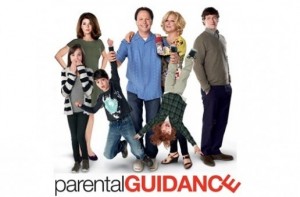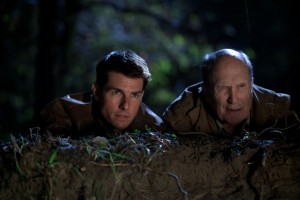Have Yourself a Merry Little Christmas
Posted on December 24, 2012 at 6:00 pm
A magical moment from “Meet Me in St. Louis” with Judy Garland and Margaret O’Brien:
http://www.youtube.com/watch?v=5g4lY8Y3eoo
Posted on December 24, 2012 at 6:00 pm
A magical moment from “Meet Me in St. Louis” with Judy Garland and Margaret O’Brien:
http://www.youtube.com/watch?v=5g4lY8Y3eoo
Posted on December 24, 2012 at 6:00 pm
D| Lowest Recommended Age: | Kindergarten - 3rd Grade |
| MPAA Rating: | Rated PG for some rude humor |
| Profanity: | Some schoolyard language |
| Alcohol/ Drugs: | Some alcohol |
| Violence/ Scariness: | Comic peril and violence |
| Diversity Issues: | None |
| Date Released to Theaters: | December 25, 2012 |
 This shtick-y, utterly synthetic sit-com of a movie telegraphs its every joke and then pounds the audience over the head to make sure we get them. Oh, we get them. We just wish we didn’t.
This shtick-y, utterly synthetic sit-com of a movie telegraphs its every joke and then pounds the audience over the head to make sure we get them. Oh, we get them. We just wish we didn’t.
Artie (Billy Crystal) is a minor league baseball announcer who always dreamed of announcing for the Giants. He is fired at the end of the season because he is too old-school. Insert “What’s Twitter?” and “What’s an Angry Bird?” jokes. His wife, Diane (Bette Midler), teaches pole dancing in their living room for no reason except that it must be funny to see middle-aged ladies try to pole dance. Their daughter, Alice (Marisa Tomei) is happily married to Phil (“That Thing You Do'” Tom Everett Scott), newly settled in Atlanta with their three children.
Phil’s new project is a super-duper high-tech home system that welcomes every family member when they come into the house, bids them farewell when they leave and talks to and spies on them in between. When Artie and Diane arrive to babysit while Alice and Phil go to a business conference, we can expect to be treated to the conflict between Artie, whose ability with technology ended with the dial phone (until the script calls for him to pull up a track on an iPod) and the high-tech house. And when Alice explains that their parenting philosophy is to say “remember the consequences” instead of “no” and insist on three “put-ups” to counter any “put-downs,” we can expect that, well, there will be consequences. Everyone tries hard, but the talented cast is utterly wasted in a series of mind-numbingly obvious and heart-numbingly phony set-ups.
http://www.youtube.com/watch?v=_9nmIzCAMJQThe oldest grandchild is Harper (Bailee Madison, giving the film’s best performance), a middle-schooler who is something of a perfectionist. She has a big violin audition coming up, a teacher who thinks anyone who isn’t up to her standards should be shunned, and an increasing sense that she is missing out on some of the fun of the pre-teen years. The youngest is Barker (Kyle Harrison Breitkopf), a high-spirited five-year-old perpetual flight risk who insists on calling his grandfather “Fartie,” which is even less hilarious than you might hope. No good asking him to consider the consequences; there aren’t any.
Then there’s the middle child, Turner (Joshua Rush), a stressed-out, shy kid with a bad stutter. The cynical sloppiness of this film is revealed in Turner’s miraculous transformation into a completely fluent speaker as the result of hearing the famous Russ Hodges “Giants win the pennant” broadcast, disrespectful in the extreme to those who struggle with speech impediments and to those who work with them.
It is filled with poorly staged slapstick and potty humor. Artie gets hit in the crotch and throws up on the face of the kid who hit him. Barker pees onto a half-pipe, causing Tony Hawk(!) to crash. There’s an extended nose-picking sequence. The consequences of these moments — this movie is awful.
Parents should know that this film has extended and graphic potty and other bodily function humor, schoolyard language, comic peril, drinking, unrealistic portrayal of a “cure” for stuttering, and mild sexual references.
Family discussion: What are the biggest differences in the styles of parenting in this movie? Which one do you agree with? What did the three kids learn from their time with their grandparents?
If you like this, try: the “Wimpy Kid” movies
Posted on December 24, 2012 at 8:00 am
This adorable film is the story of Christmas as told by the children of St Paul’s Church, Auckland, New Zealand.
Posted on December 22, 2012 at 1:02 pm
 Jack Reacher, the hero of a series of books by Lee Child
Jack Reacher, the hero of a series of books by Lee Child, is as much an idealized fantasy figure as any adorkable chick-lit single girl rocking her Jimmy Choos and self-deprecating quips until Mr. Perfect puts a ring on it. The testosterone version has the observational and analytic skills of Sherlock Holmes, the “who was that masked man” righting-wrongs-and-leaving-town career path of the Lone Ranger, and the single-minded devotion to righteous indignation firepower of Rambo, and he will never, ever, ever put a ring on anyone.
Reacher is ex-military, and ex-pretty much everything else. He has no strings, no relationships, no commitments — also, no id, no phone, no home, and no baggage, in both the literal and metaphorical sense. When he needs to change clothes, he picks up something at Goodwill and throws away whatever he was wearing before. When he needs a car, he has a very effective way of persuading people to let him drive theirs. Or, he just takes one. And he keeps moving.
http://www.youtube.com/watch?v=kK7y8Ou0VvMIn the books, Reacher is 6’5″ and 250 pounds and blond. But that did not stop Tom Cruise, who is none of those things, from taking the role. He more than makes up for the lack of physical stature with pure movie star charisma, a fair trade.
The movie is based on Child’s One Shot, written and directed by “The Usual Suspects” screenwriter Christopher McQuarrie. It opens with a scene of a sniper shooting random passers-by, and it is especially jarring when we see him aiming at a child. I would say that it might have made sense to delay the release of the film because it is unfortunate to have it open a week after the shooting of children and teachers in Newtown, Connecticut, but it may be that after that horrible tragedy there will never be a good time for a movie that turns carnage into entertainment. Within the world of the movie, a world people willingly enter because they want to see some guilt-free fights, chases, and shoot-outs, it is reasonably effective. But if it is harder to enter that world these days, perhaps that is not a bad thing.
Law enforcement tracks down the sniper, a military vet, and the case seems open and shut. But before he is beaten into a coma by other prisoners, he scrawls “Get Jack Reacher.” Reacher can’t be contacted, but somehow he knows where he is needed, and he shows up. The sniper’s lawyer Helen (Rosamund Pike) believes her client is guilty, but wants to do her best to represent him. It turns out Reacher knew the sniper in Iraq. He has reason to believe the sniper is guilty. And, as Reacher tells us, he is not a hero.
Oh, who is he kidding, of course he is. Surprise! The case is not as open and shut as we thought. There are some dreary detours into Helen’s relationship with her father, who happens to be the DA, and to a hideous torture scene with a bad guy known as “The Zec” (Werner Herzog, better known as a director), and a five-on-one bar fight, and than, thankfully, we meet up with Robert Duvall as a ex-Marine shooting range owner. He is the only one who seems to understand what kind of movie this is, bringing a delicious zest to his scenes that almost make us forget that this is a movie in which a man is asked to bite off his own fingers and everyone seems to speak Russian.
It delivers what it intends to and what fans of the series are looking for. But I’d say it’s too soon, and maybe it’s never going to be the right time for a mindless shoot-em-up again.
Parents should know that this film includes extensive, brutal and graphic violence including a sniper who kills innocent people and executions, many fights, many guns, car chases and smashes, torture, some disturbing images, characters injured and killed, some strong language (one f-word, crude epithets), drinking, and references to drug use and drug dealing.
Family discussion: Why does Jack stay on the move? Did Emerson have a choice?
If you like this, try: the Jack Reacher books by Lee Child